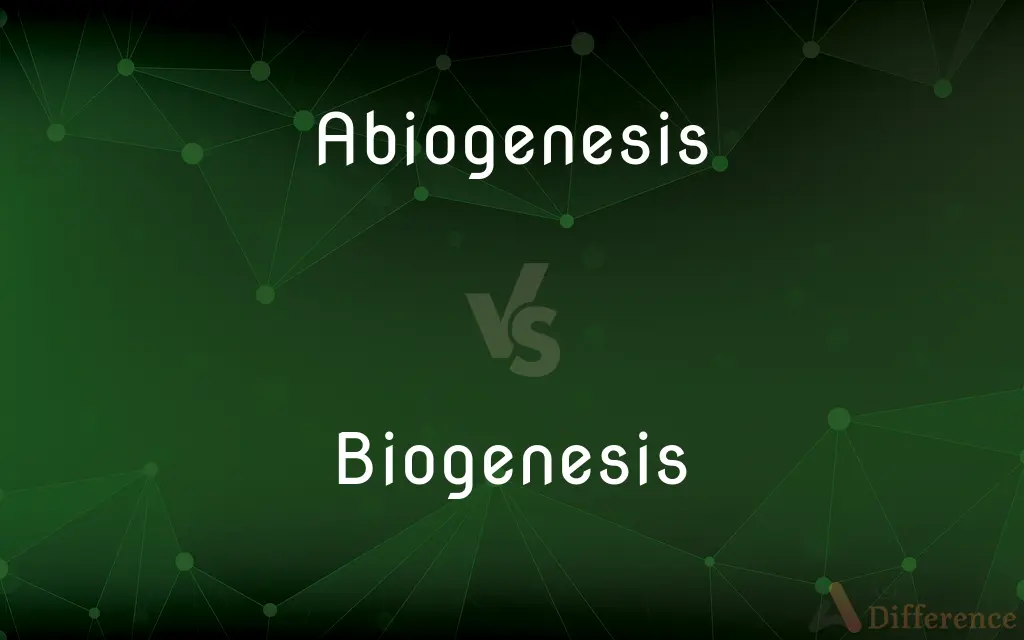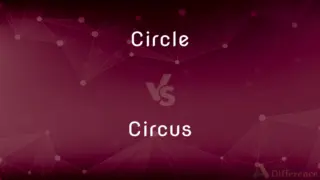Abiogenesis vs. Biogenesis — What's the Difference?
Edited by Tayyaba Rehman — By Urooj Arif — Updated on March 27, 2024
Abiogenesis refers to the original evolution of life from non-living matter, while biogenesis is the concept that living organisms come from other living organisms.

Difference Between Abiogenesis and Biogenesis
Table of Contents
ADVERTISEMENT
Key Differences
Abiogenesis, or spontaneous generation, posits that life originally arose from non-living materials, a fundamental principle for understanding the origins of life on Earth. In contrast, biogenesis, rooted in the work of Louis Pasteur, asserts that all living organisms are the offspring of other living organisms, challenging the notion of spontaneous generation and emphasizing the continuity of life.
Abiogenesis was a widely held belief that life could spontaneously arise from non-living matter under certain conditions. This idea supported the formation of life on Earth billions of years ago from simple organic compounds. On the other hand, biogenesis, supported by modern science, insists on a lineage of life, where every living thing descends from a pre-existing life form, negating the possibility of life spontaneously arising in the current era.
Abiogenesis plays a critical role in theories about the origin of life on Earth and potentially on other planets. It seeks to explain how simple organic molecules could evolve into more complex forms, eventually leading to living organisms. Biogenesis, however, is key to understanding reproduction, growth, and the biological development of living organisms, focusing on the processes that sustain life rather than how it began.
The study of abiogenesis involves a multidisciplinary approach, incorporating chemistry, physics, and biology, to hypothesize about the Earth's early conditions and the chemical reactions that might have led to life. Biogenesis, while it builds on the principles of biology, particularly genetics and cellular biology, explains how life perpetuates through reproduction and genetic inheritance.
Abiogenesis remains a theoretical field with ongoing research aiming to recreate early Earth conditions and understand the chemical origins of life. Biogenesis, however, is a well-established principle in biology, supported by empirical evidence showing that organisms arise from parents similar to themselves.
ADVERTISEMENT
Comparison Chart
Definition
The theoretical process by which life arises naturally from non-living matter.
The process by which new organisms are produced by existing organisms.
Scientific Basis
Theoretical, with experiments like the Miller-Urey experiment offering insights.
Empirical, grounded in observations and experiments such as those by Pasteur.
Historical Context
Predates modern science, with roots in ancient philosophies.
Became scientifically accepted in the 19th century, notably through Pasteur’s work.
Focus
Origin of life on Earth and potentially other planets.
Reproduction, growth, and development within the realm of existing life.
Field of Study
Interdisciplinary, involving chemistry, biology, and earth sciences.
Biology, specifically in genetics, cellular biology, and evolutionary theory.
Compare with Definitions
Abiogenesis
Origin of life from chemical precursors.
The Miller-Urey experiment simulated early Earth conditions to support abiogenesis.
Biogenesis
Fundamental concept in cellular and molecular biology.
Biogenesis explains the complex process of cell division and growth.
Abiogenesis
Basis for studying the origins of life on Earth.
Research in abiogenesis explores how RNA might have catalyzed the first biochemical reactions.
Biogenesis
Principle that living organisms come from other living organisms.
Biogenesis is evidenced by the reproduction of plants and animals.
Abiogenesis
Conceptual framework for the emergence of life.
Abiogenesis theories contemplate how life might emerge on exoplanets.
Biogenesis
Core principle in the study of life’s continuity.
Biogenesis supports the understanding of life cycles in ecosystems.
Abiogenesis
The theory that life originally formed from inanimate substances.
Abiogenesis suggests life on Earth began in water-rich environments.
Biogenesis
Basis for understanding heredity and evolution.
Biogenesis underpins the study of genetic inheritance and evolutionary biology.
Abiogenesis
Natural process leading to the first simple life forms.
Abiogenesis involves the transition from simple organic molecules to complex cells.
Biogenesis
Guiding principle for biological research.
Studies in biogenesis have led to advances in medicine and agriculture.
Abiogenesis
In evolutionary biology, abiogenesis, or informally the origin of life (OoL), is the natural process by which life has arisen from non-living matter, such as simple organic compounds. While the details of this process are still unknown, the prevailing scientific hypothesis is that the transition from non-living to living entities was not a single event, but an evolutionary process of increasing complexity that involved molecular self-replication, self-assembly, autocatalysis, and the emergence of cell membranes.
Biogenesis
Biogenesis is the production of new living organisms. Conceptually, biogenesis is sometimes attributed to Louis Pasteur and encompasses the belief that complex living things come only from other living things, by means of reproduction.
Abiogenesis
The supposed development of living organisms from nonliving matter. Also called autogenesis, spontaneous generation.
Biogenesis
The principle that living organisms develop only from other living organisms and not from nonliving matter.
Abiogenesis
(evolutionary theory) The origination of living organisms from lifeless matter; such genesis as does not involve the action of living parents.
Biogenesis
Generation of living organisms from other living organisms.
Abiogenesis
The supposed origination of living organisms from lifeless matter; such genesis as does not involve the action of living parents; spontaneous generation; - called also abiogeny, and opposed to biogenesis.
I shall call the . . . doctrine that living matter may be produced by not living matter, the hypothesis of abiogenesis.
Biogenesis
See biosynthesis.
Abiogenesis
A hypothetical organic phenomenon by which living organisms are created from nonliving matter
Biogenesis
The supposed recurrence of the evolutionary stages of a species during the embryonic development and differentiation of a member of that species. Also called recapitulation.
Biogenesis
The principle that living organisms are produced only from other living organisms.
Biogenesis
Biosynthesis.
Biogenesis
A doctrine that the genesis or production of living organisms can take place only through the agency of living germs or parents; - called also biogeny; - opposed to abiogenesis.
Biogenesis
The production of a chemical compound by a living organism.
Biogenesis
Production of a chemical compound by a living organism
Biogenesis
The production of living organisms from other living organisms
Common Curiosities
Can abiogenesis occur today?
According to current scientific understanding, abiogenesis is an event that occurred under the unique conditions of early Earth and does not happen under present conditions.
How do scientists study abiogenesis?
Scientists study abiogenesis through experiments that simulate early Earth conditions and through theoretical models that explore how organic molecules could form complex life forms.
How does biogenesis explain evolution?
Biogenesis provides the framework for understanding evolution, as it explains how genetic information is passed down through generations, leading to the diversity of life through natural selection.
What role does DNA play in biogenesis?
DNA plays a central role in biogenesis as it contains the genetic instructions for the development, functioning, and reproduction of all known living organisms.
What is abiogenesis?
Abiogenesis is the theory that life on Earth originally formed from non-living matter through natural processes.
Why is biogenesis important in biology?
Biogenesis is crucial for understanding how life reproduces, evolves, and maintains continuity through genetic inheritance and cellular processes.
Is biogenesis a proven theory?
Biogenesis is a well-established principle in biology, supported by extensive empirical evidence demonstrating that life comes from life.
How does abiogenesis differ from biogenesis?
Abiogenesis describes the origin of life from non-living material, while biogenesis asserts that all living organisms originate from pre-existing life.
What experiments support abiogenesis?
The Miller-Urey experiment is one of the most famous studies supporting abiogenesis, demonstrating that organic compounds could be synthesized from inorganic precursors under conditions similar to those of early Earth.
Does abiogenesis conflict with religious beliefs?
The concept of abiogenesis may conflict with certain religious beliefs regarding the origin of life, but many people reconcile their faith with scientific theories through various interpretations.
Share Your Discovery

Previous Comparison
Paysheet vs. Payslip
Next Comparison
Circle vs. CircusAuthor Spotlight
Written by
Urooj ArifUrooj is a skilled content writer at Ask Difference, known for her exceptional ability to simplify complex topics into engaging and informative content. With a passion for research and a flair for clear, concise writing, she consistently delivers articles that resonate with our diverse audience.
Edited by
Tayyaba RehmanTayyaba Rehman is a distinguished writer, currently serving as a primary contributor to askdifference.com. As a researcher in semantics and etymology, Tayyaba's passion for the complexity of languages and their distinctions has found a perfect home on the platform. Tayyaba delves into the intricacies of language, distinguishing between commonly confused words and phrases, thereby providing clarity for readers worldwide.
















































